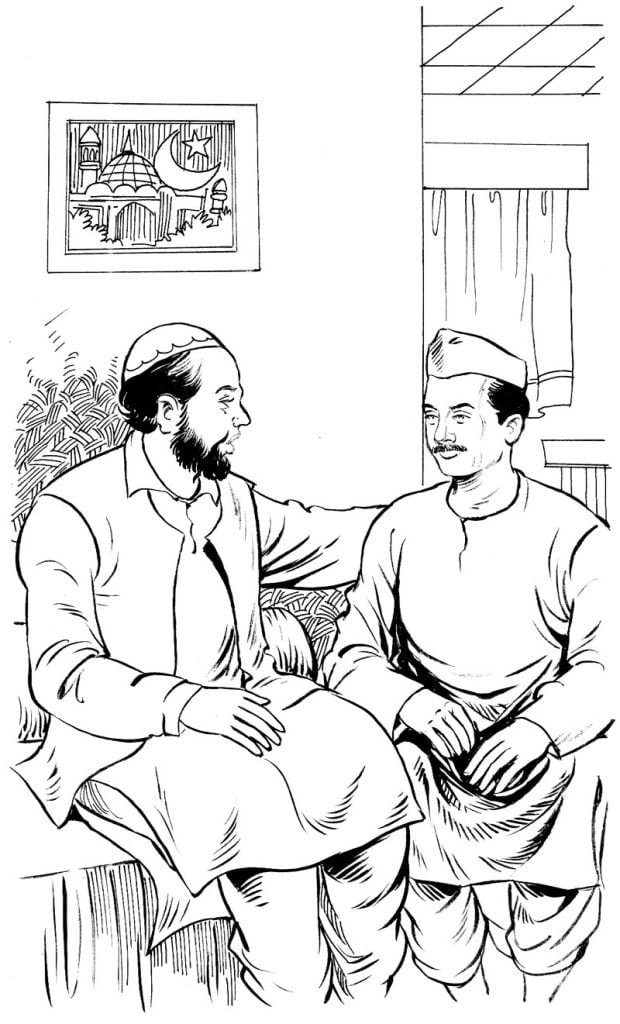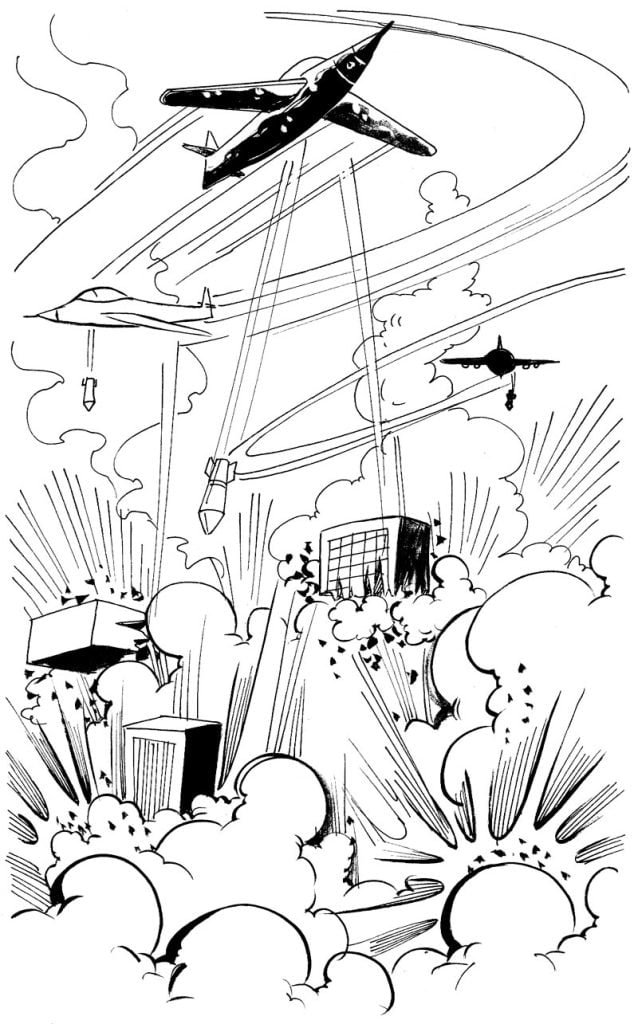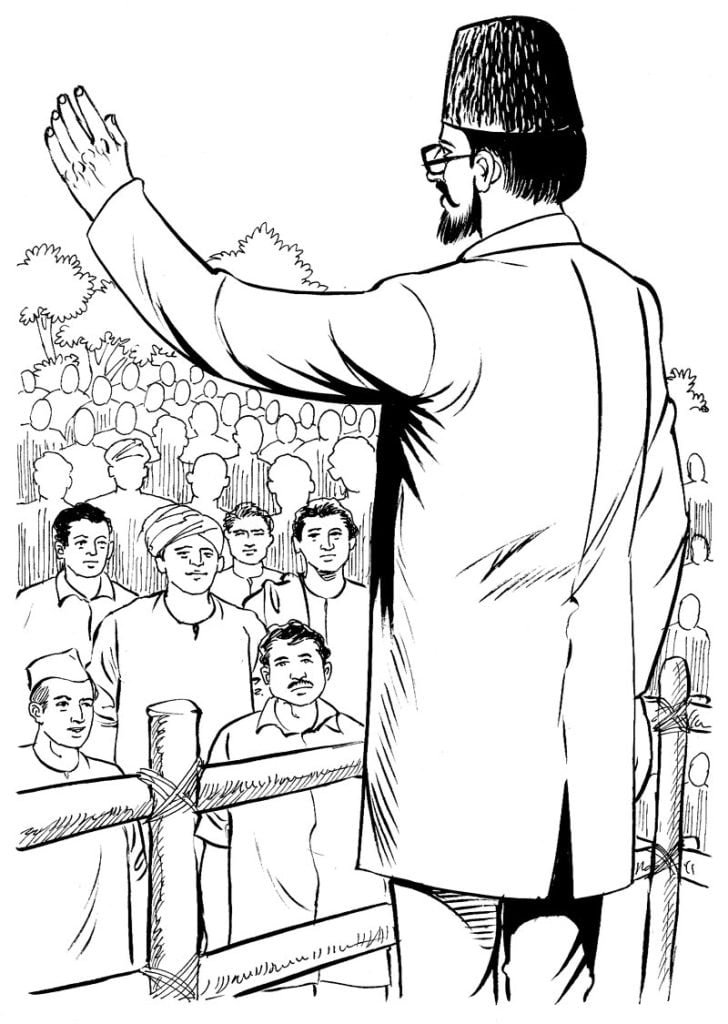On June 22, 1941 Germany attacked over Russia. His armies proceeding further rapidly after entering Russia. On the other side Japan had captured a large part of China.
Japan attacked at Pearl Harbour, America in 1941. Then dropped bombs over Colombo on April 5, 1942 and next day i.e. April 6th made an air attack over Kakinada and Vishakhapatnam too.
In these circumstances there was a pressure over England to became somewhat soft towards India. England sent a delegation under the chairmanship of Stafford Cripps to India in March 1942.
Reaching Delhi on 22nd March this delegation held meetings with important political leaders among which Gandhi, Jawahar and Jinnah were the main. The Mission also met with representatives of native kings also. This delegation was known as Cripps Mission.

It put up two suggestions :
1. There was explanation of structure and mode of constitution.
2. That to run Indian govt. Viceroy will modulate its working committee immediately.
It was clearly mentioned in it that after war India will obtain the same position as obtained by other colonies. A council will be framed to form the constitution, which will be elected by state assemblies. State will have the right that if they desire they might get separation from Indian Union.
Congress leaders clearly declined it. Muslim League and Hindu Mahasabha too reject it.
After this rejection keeping in view the seriousness of world war govt. imposed several new taxes.
For reviewing the circumstances Congress held a meeting at Allahabad on April 27, 1942. The meeting continued till six days, but Gandhiji couldn’t attend it. It this meeting it was decided that Congress would neither interfere in the matters relating to war nor it shall cooperate the govt. in this respect.
On this occasion Babu Rajendra Prasad said, “We do not desire to create any hurdles for British. Our only aim is to oppose the tyranny of British.’’

This decision was also taken by the Congress leaders that if Japan armies enter India then Congress will declare non-violent non-co-operation with it, but would not surrender in any circumstances.
Gandhiji was of the view that if British leave India peacefully then all sorts of problems will be solved.
Ergo on July 14, 1942 Congress Working Committee held a meeting at Wardha in which decision was taken that becoming India free is necessary to sort out problems of Nazism, Fascism, Imperialism or invasion by one nation over the other.
Hence Gandhiji put up a proposal for ‘Quit India Movement’ which was accepted unanimously.
After it Rajendra Babu left for Patna. Reaching Patna he fell ill and started living in Sadakat Ashram.
On Aug. 8, 1942 All India Congress accorded Quit India proposal of working committee. On this occasion Gandhiji gave a slogan—‘Do or Die?’
He also made it clear that it is for welfare of both India and United States that British rule should be abolished from India immediately. Independence is the birth right of every Indian.
On 9th Aug. 1942 Collector of Patna W.G.R. Chur accompanied civil surgeon called Rajendra Babu about his health. But actually they wanted to arrest Rajendra Babu. And he was arrested.
Getting this information his wife and sister came to see him. At this time he was so weak that he was unable to walk even. Hence he was taken to Bankipur prison. When he was being escorted some students got this information. Some of them reached there. They garlanded him and shouted slogans.

After getting the news of his arrest students held a meeting in University Complex Patna. Later on students went to governor house in a procession and then to Bankipur prison. At both places students protested peacefully.
On the otherside some other Congress leaders from Bihar were arrested on return from Mumbai. Shri Krishna Singh, Mahamaya Prasad, Anugraha Narayan Singh were among them.
The govt. imposed a ban on Congress.
Sadakat Ashram, Distt. Congress offices, Kisan Sabha office and Congress Socialist office, all were reated.
In that manner govt. turned harsh but the movement became more pungent. Congress workers went to villages and promulgated Gandhiji’s messages.
Neglecting govt. orders meetings were held in villages and cities. Processions were carried out.
Lawyers boycotted the courts. Students left the educational institutes. Police and high officials were also requested not to harass the non-violent volunteers.
All were fighting for freedom. Villagers requested to solve their disputes through Panchayats.
It was also decided that national flag should be hoisted on all govt. offices.
A group of students proceeded towards Patna secretariat. Their intention was to hoist the flag on secretariat, but police opened fire in which seven students were killed.
The news spreaded all around like fire and people got angry. Rails were uprooted and transmission wires were chopped.
Police too seemed gloomy and dejected. Govt. called military to crush the movement and people were arrested, their properties were confiscated.
All newspapers were banned. Govt. newspaper ‘Patna Times’ only was in circulation and that was the one which was available in prison.
On getting the news of British cruelties Gandhiji declared fast unto death in prison.
After sometime some of the prisoners were shifted to other prisons and some were set free by October 1943.
In this interchange Manendra Nath Ghosh came to prison with Rajendra Babu. The govt. formed a committee which visited prisons every month. On its recommendation political prisoners were released or transferred. When Rajendra Babu was asked in this respect, he said, “Until all people are set free till then I will remain in jail.”
In his prison life Rajendra Babu wrote the book ‘India Divided’.
